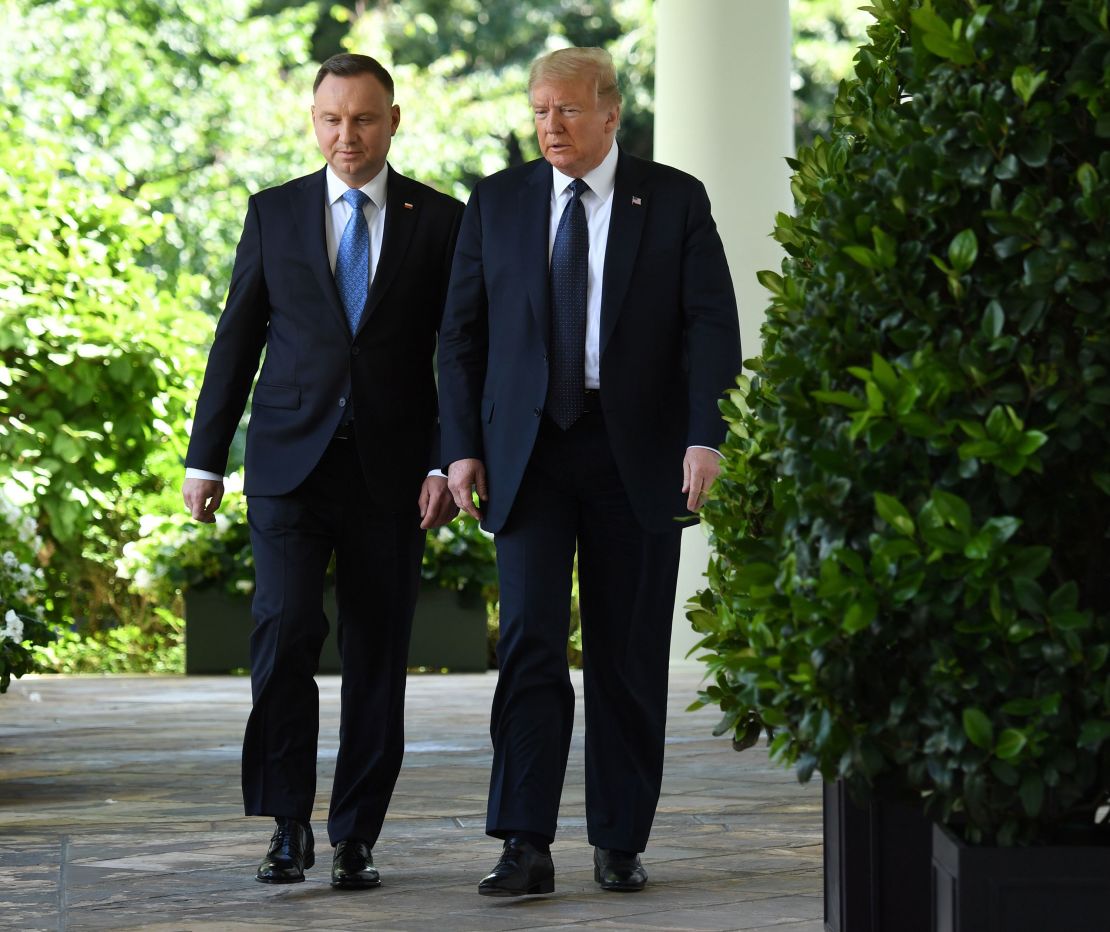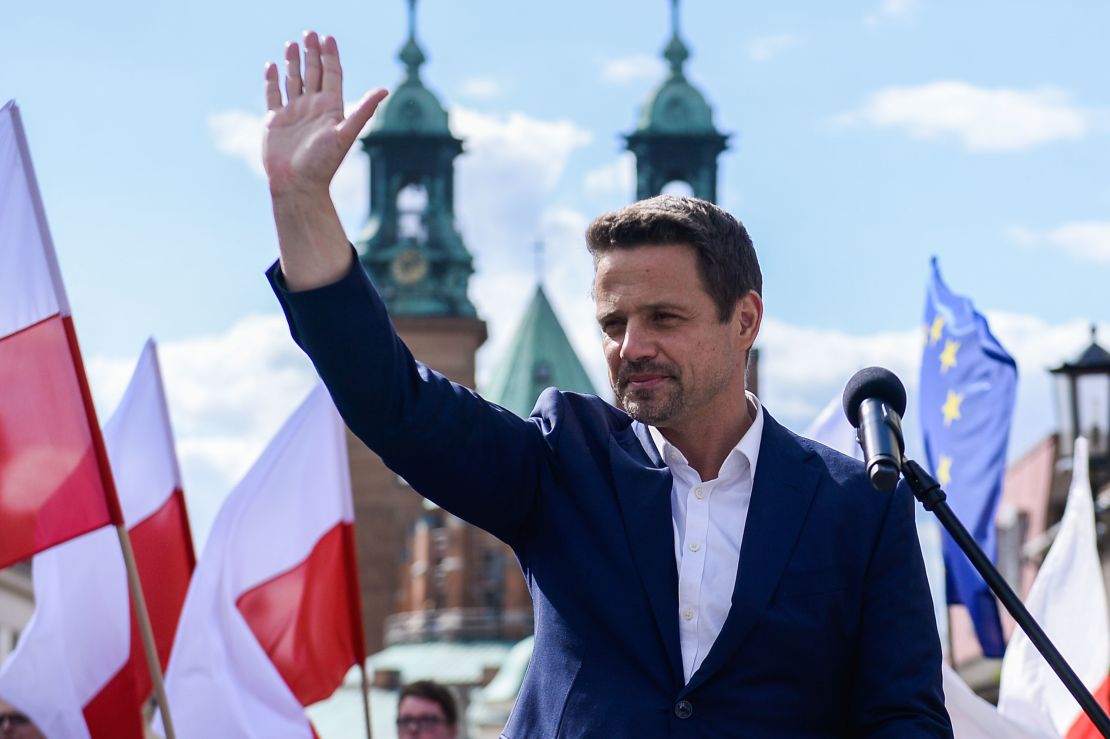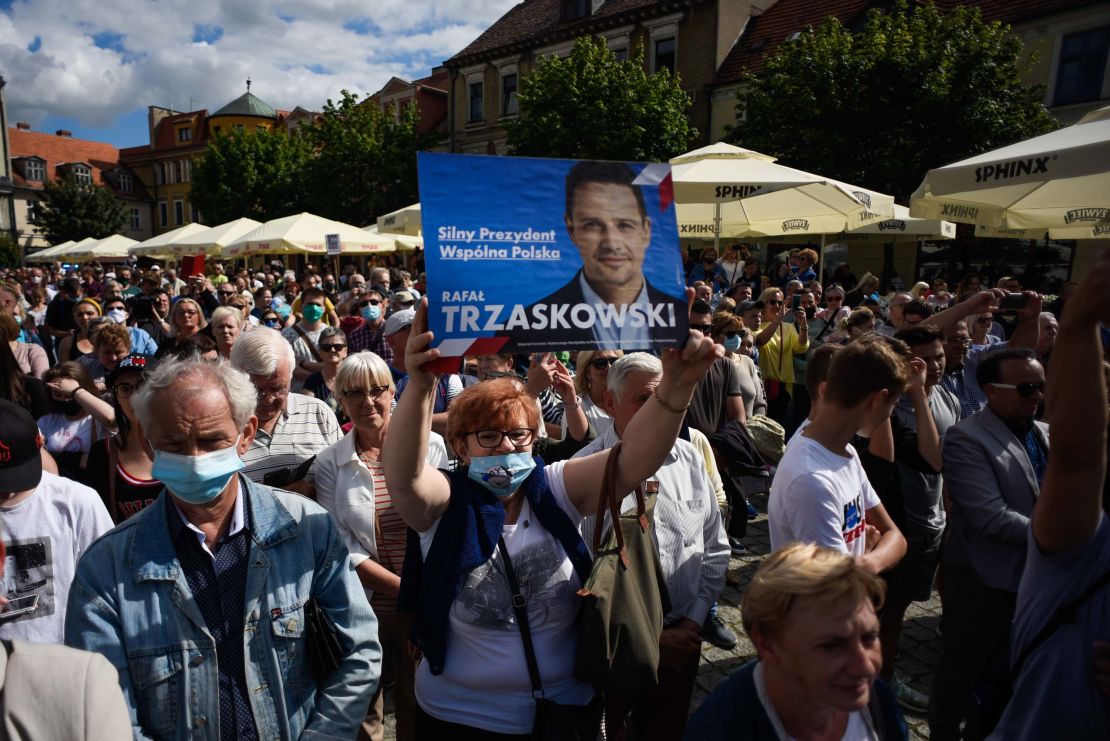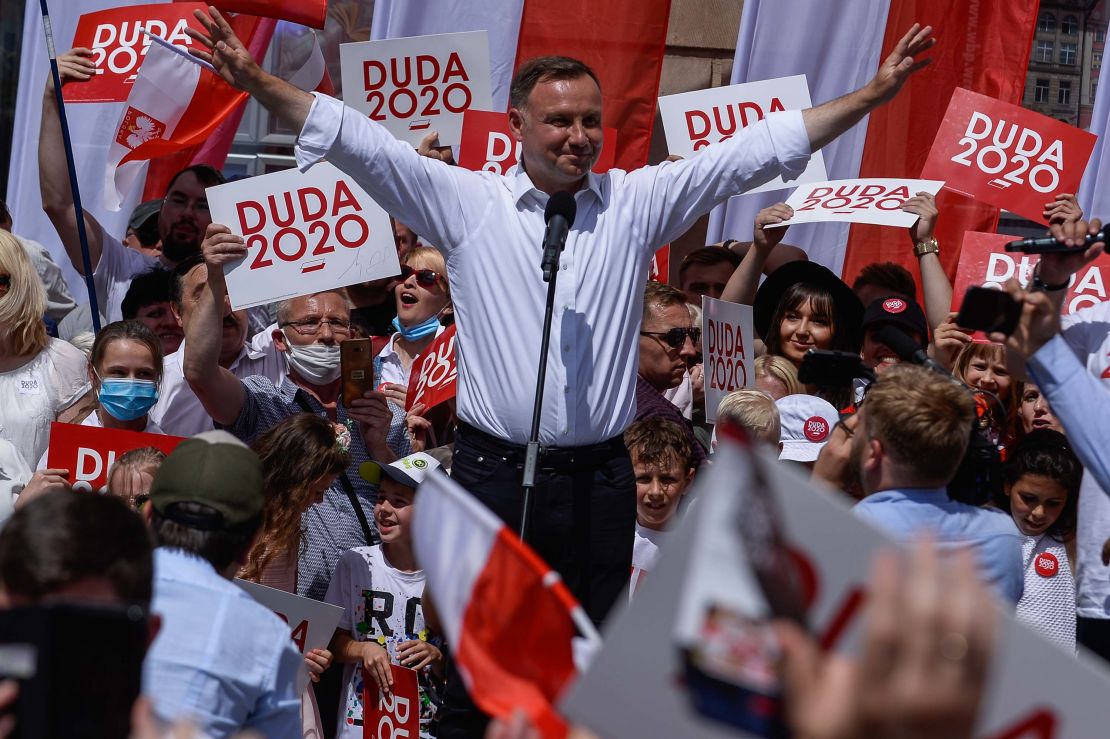Poland is a country deeply divided over cultural issues, and the direction the former Soviet bloc nation should take next: does it want to be a European-style liberal democracy, or does it take a more authoritarian path?
The government’s erosion of gay rights has put it on a collision course with Europe, as have its radical reforms to the courts. These changes are viewed by other European Union leaders as having politicized the judiciary and undermined the rule of law.
Now the country will go to the polls Sunday for a second-round vote in what could be the country’s most consequential presidential election in decades. The outcome could shape Poland’s future direction within the European Union and reverberate well beyond its borders.
The battle between the remaining candidates – populist incumbent Andrzej Duda, backed by the ruling Law and Justice party (PiS), and his more liberal challenger, Warsaw Mayor Rafal Trzaskowski, of the center-right Civic Platform party – has become increasingly contentious.

President Duda came out on top in the first round on June 28 with 43.5% of the ballots cast, according to the National Electoral Commission, while Trzaskowski, who entered the race only a few weeks ago, took about 30.5% of the vote. Turnout was high, at over 64%.
But observers predict a much closer second round, as the pair fight to pass the vital 50% threshold by winning over voters who backed candidates now out of the race.
During campaigning, Duda – who met with US President Donald Trump at the White House last month – has sought to mobilize his more conservative, largely rural base with appeals to traditional Catholic values and a promise to maintain popular social welfare policies, such as a child allowance and lower pension age.
But comments in which he described LGBTQ rightsas an “ideology” worse than Soviet-era communism sparked wide criticism, prompting Duda to tweet that his words had been “put out of context” as part of a dirty political fight.
“I truly believe in diversity and equality,” he said, before adding: “At the same time, beliefs of any minority cannot be imposed on a majority under the false pretense of tolerance.”

Trzaskowski, who has previously served as an opposition minister and member of the European Parliament in Brussels, told CNN the election was important because “the current government is monopolizing all the power” and attacking key institutions.
“We need a break, we need a balance of power where the president of the Republic can cooperate with the government as needed – for instance, when it comes to restoring good relations with the European Union – but who is ready to veto legislation, for instance, that meddles with the rule of law,” he said Wednesday in Szczecin, northwest Poland, where he was holding a campaign rally.
The government wants to focus debate solely on the LGBTQ issue, Trzaskowski said. As mayor of Warsaw, he said, “I was always standing next to those who are marginalized. Disabled people, people of minorities, people are sent to the margins of society by this government.”
And if reelected, Duda is likely to continue to rubber-stamp the agenda shaped by PiS leader Jaroslaw Kaczynski, Piotr Buras, head of the Warsaw office of the European Council on Foreign Relations, told CNN.

Basic rights
LGBTQ protesters rallied in the capital, Warsaw, on Thursday against Duda’s position on gay rights.
Just on Monday, Duda signed a draft amendment to the Constitution which, if approved, would bar the adoption of a child by a same-sex couple, saying his goal was to “support the Polish family, protect Polish children.”
While in power, the PiS has increased its use of homophobic rhetoric, pride parades have been targeted by counter-protesters, and pro-government publications have distributed stickers declaring cities an “LGBT-free zone.”
Trzaskowski also said in recent days that he’s against the adoption of children by same-sex couples but has previously committed to supporting LGBTQ rights.
Trzaskowski supporter Jakub Lipczinsky, who attended the rally Wednesday in Szczecin, told CNN he was “deeply concerned about what’s happening with our basic rights” at the hands of the current government.
“I have to say that I have never seen such a reckless attitude against our beliefs, our values,” he said. “And it is with such an arrogance. And so it is of utmost importance for us to stop this process of breaking law. If our candidate won the election, it would be a great step toward the improvement of this political situation in our country.”
Lipczinsky said he believed in respecting other people’s views on their sexuality and their right to express themselves freely. “Once your basic right to express yourself and your sexuality is broken it is difficult to still speak of a democracy,” he said.
Another Trzaskowski supporter, Hannah Nikolaiczyk, told CNN the politician represented change that was much needed.
“It is important that Poland is not closed and separated from other countries,” she said. “It is important to work with them. It’s important to see the change that is about to happen and I hope that Poles see that as well.”
Nikolaiczyk said she was motivated by concerns over LGBT rights and the constitution, but also issues such as health care and its approach to Europe. “I think it is important to be open instead of closing and doing everything against connections with other countries,” she said.
Andrzej Krasnitzky, also at the rally, described Duda as “like a puppet on a string in the hands of Kaczynski” and said he feared that after another five years with him in power “our democracy will completely be destroyed.”

Others disagree, saying Duda and the ruling coalition are carrying out much-needed reforms.
Jakub, a 48-year-old Duda supporter in Warsaw who declined to give CNN his last name, said: “I vote for Duda because I want to ensure continuity of government so that the current government can continue reforms. This government has evened out the social divide in Poland and President Duda is necessary, so that what was done would not be wasted.”
Duda’s campaign has not yet responded to a request for comment on claims that the President has undermined the rule of law in Poland, eroded gay rights and rubber-stamped the PiS agenda.
Collision course with Europe
Although cultural issues have dominated campaigning, the outcome of the election has wider ramifications for Europe.
As one of the largest economies in the bloc, a big player in central Europe and a major beneficiary of EU funding, Poland should have clout.
But if Duda is reelected, Poland is likely to remain “sitting on the sidelines in Europe,” said Milan Nic, of the German Council on Foreign Relations, “not playing its full weight… and seen as simply on a different wavelength to Germany and the rest of western Europe” on issues such as climate policy and energy, thanks to its reliance on coal.
Trzaskowski told CNN he wanted to see Poland back at the table. “Poland and this government are completely marginalized within the European Union. So it’s not treated that seriously by the big powers,” he said.
If Poland continues on its current path, in which the rule of law has been undermined by a politicization of the judiciary and public media, fellow EU member states may try to rein it in by attaching conditionality to EU funding, Buras suggested. But the PiS has until now been emboldened by the example of Hungary, where Viktor Orban has imposed an increasingly authoritarian rule in defiance of the EU.
Gerald Knaus, chairman of the European Stability Initiative think tank, said this election could be a turning point.
“One of the most important issues is the relationship between Poland and what has been the framework for the most successful period in Polish history – EU membership,” he told CNN from Berlin.
“The position of the PiS, which Duda has been supporting in recent years, is that Poland can remain a full member of the EU and can benefit and continue to benefit more than any other countries from structural assistance while charting an independent course on issues like the rule of law.”
Looking beyond Europe, both candidates are keen to maintain strong ties with the United States, which has troops stationed in Poland and is a longstanding ally.
Duda has forged a tight relationship with Trump since the US President visited Warsaw in 2017.
Trzaskowski, on the other hand, tweeted on July 1 that he would be speaking with former US President Barack Obama that evening “about the importance of Polish democracy within the European Union and the significance of the U.S.-Polish alliance.”
What is the path to victory?
Despite his apparent momentum, Trzaskowski faces an uphill struggle to claim victory on Sunday based on the first-round tallies.
Duda has presided over a period during which Poland’s economy has been in very good shape, said Buras, in part because of reforms enacted by the government since it was elected in 2015. And his message to voters is that the very close cooperation between president and government is in the interests of Poland and should continue.
Duda’s harsh language on LGBT issues appears to be an attempt to mobilize the so-called “silent majority” by painting Trzaskowski “as someone who, once elected, will be a source of cultural Armageddon,” Buras said, although this approach may have reached its limit.
In Sunday’s vote, Trzaskowski is likely to garner support from those who previously backed third-placed Szymon Holownia, a former TV host who ran as an independent, and left-wing candidates.
But to win, he must also pick up voters who supported far-right Confederation candidate Krzysztof Bosak two weeks ago, said Buras.
Although some will prefer Duda for his conservative values, others may now back Trzaskowski for reasons of free market radicalism, since they dislike the big-state spending of the PiS, or simply to prevent PiS from killing off their party as its chief competitor on the right, said Buras.
The fact that the second-round vote falls in the holiday season may benefit Duda, since the more affluent, urban voters who tend to back Trzaskowski are more likely to be away, said Nic.
But it’s not yet clear how fears over the coronavirus – or the fact that Poles already made the effort to vote in the first round – will affect turnout, or how the debate over gay rights will galvanize voters.
“Trzaskowski stands for a more active Polish presence in the EU, more pro-European, more ambitious for climate policy and energy transformation,” said Buras. “But in the end he bets on those voters who feel fed up with the PiS.”
CNN’s Laura Smith-Spark wrote and reported from London, Frederik Pleitgen reported from Szczecin. CNN’s Claudia Otto contributed to this report.





